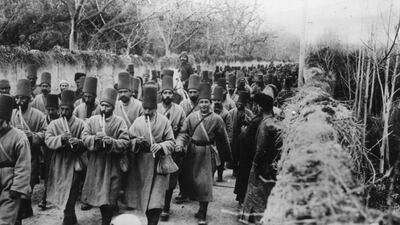John Dennehy
Water-logged trenches, screaming shells and battlefields of mud. These are the images that have long dominated perceptions of the First World War.
But what about the destruction of the Ottoman Syrian civilian population? What about the negative legacy for Iraqi women?
These are just some of the interesting topics up for discussion at The First World War and its Aftermath: The Shaping of the Middle East, a conference to be held in London next month.
It will examine the war, the aftershocks of the conflict and how it reshaped the identities of the peoples of the Middle East.
For the people of Ottoman Syria, including Lebanon, the carnage of the Great War was particularly devastating. According to Najwa Al Qattan, a “perfect storm” of mutually reinforcing catastrophes devastated the population, torn apart as the British and the Ottomans battled it out.
“The poor, the middle-class reduced to poverty by 1918, peasants in Mount Lebanon, women and children suffered the most. Nature (including human nature) colluded with wartime conditions and led to countless deaths by famine and disease,” says Al Qattan, a professor at Loyola Marymount University in LA.
Al Qattan will examine Lebanese civilian responses to the war by focusing on writers’ and poets’ use of history and how notions of identity and community were fluid in a time of crisis.
“Most were illiterate and/or too exhausted to record their experiences before they passed. But many of the survivors who wrote about their experience describe communities that broke down at every level.”
The story of women and the war in Turkey and Iraq will also be the subject of two talks at the conference. Firstly, in Turkey, the period up to and during the war had resulted in gains for women in education, work, family life and greater visibility in cultural and social spaces.
But after the war, the main role of women was still seen as being wives and mothers, living in the domestic sphere, and did not present a radical challenge to established gender roles, says Sevinç Elaman, of the University of Manchester in the United Kingdom. “This paradox is articulated eloquently by a new group of feminists since the early 1980s through the phrase ‘emancipated but unliberated’,” she says.
“We cannot deny that reforms opened new doors for women in terms of legal and social corrective implications. Yet they did not alter the patriarchal norms.”
In Iraq, meanwhile, the story is more severe. In the new state, women were considered as tribal possessions rather than citizens. This was because of a law introduced by the British in 1916 that became a state law in 1924.
“Iraqi officials and intellectuals, men and women, Sunnis and Shias, opposed the regulation which divided the citizens of Iraq into two groups with two different legal systems – one for urban and the other for rural dwellers,” says Noga Efrati, of the Open University of Israel.
“The regulation legitimised honour murders and allowed that in the settlement of feuds, especially blood feuds, the guilty party, in addition to paying blood money, would hand over one or more women from his clan to the tribe or family of the victim for the purpose of marriage. In addition, a woman had to receive her cousin’s consent to marry and, if overlooked, the cousin was justified in killing the woman or the man she ultimately married.”
This law was the subject of much protest by female figures at the time, who said it allowed men unbridled power over women’s lives.
Meanwhile in Egypt, the years before and up to the Great War resulted in hundreds of thousands of refugees moving to the country – Armenians, Lebanese and Syrian Maronites, Druze and more. Some were allowed to come if they invested money; others came in search of work.
Amany Soliman, of Alexandria University, will examine the rise of Egyptian nationalism and the perception of foreigners in the country from 1914 to 1923.
“Nationalists mixed their resentment of the [British] occupation with anger against the biggest interest group in the country, which was the foreigners,” she says.
“There were different perceptions of foreigners by pro-nationalism intellectuals and educated Egyptians. This ranged from hate speech down to nationalists who thought that foreigners were very important to the economic, cultural and social interests of Egypt.
“Egypt had a multicoloured religious environment at this time. It was a very big mosaic.”
• The conference is organised by the Gingko Library and takes place in London from December 6 to 7

